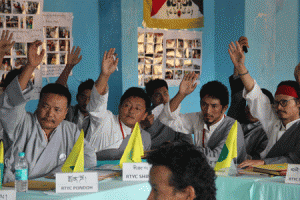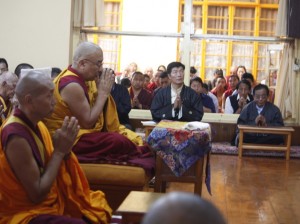
TYC members voting for the launch of the September 3rd hunger strike - Photo from tibetanyouthcongress.org
On August 12th the Tibetan Youth Congress held its 43rd working committee, with 115 members representing 42 regional chapters in attendance. In addition to conducting educational workshops, attendees focused on addressing the most recent developments in the China-Tibet situation and have declared an indefinite hunger strike campaign to start on 3 September in New Delhi. Three central executives have confirmed their participation – Dhondup Lhadar, Vice President; Penpa Tsering, Organizational Secretary, and Jigme (Sholpa), Cultural Secretary of TYC.
This is the third installment of a series of hunger strikes organized and lead by the TYC. The first took place in April of 2011 in front of the United Nations building in New Delhi and lasted for 25 consecutive days. Its primary motivation was to incite stronger interest and participation from the international community in the Tibet-China situation, as well as to increase media coverage of the Tibetan struggle. Although the results of this protest fell short of its goals, the participants didn’t go home empty-handed. A letter from the European Parliament urging the protestors to stop and promising to move Tibet up on their priority list was delivered by the EU attaché.
The second hunger strike, which lasted 30 days, took place in New York in February 2011. It followed a similar strategy by striving to exert more pressure on the United Nations to demand that China open Tibet to international media and end its undeclared state of martial law in Tibet. The strike ended after a response from the UN was issued expressing complete support for the protester’s demands and promising to do more to facilitate political and social change in Tibet.
Sadly, this time around the stakes are even higher. The number of self-immolations has skyrocketed to 50, indicating the growing desperation of the Tibetan people. According to the TYC ‘s General Secretary, Tenzin Chokey, the upcoming hunger strike is intended as an urgent reminder for international parties, the EU and UN in particular, to act upon their promises and to start taking a proactive stance on the issue. This means that both the EU and the UN will have to do something beyond expressing sympathy towards the plight of Tibetans.
But, more importantly, the upcoming hunger strike is going to focus on delivering a very timely message to the Tibetan community urging it to not give up hope and to persevere in their non-violent struggle, despite the reluctance of international parties to put their support into concrete actions. “As activists, we don’t have the privilege of being pessimistic,” said Tenzin Chokey. And so the push continues.




 Print
Print Email
Email